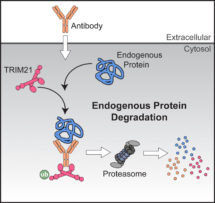
All the cells in our body contain thousands of proteins, molecular machines which carry out almost all biological processes that are essential for life. Many diseases, such as cancer and neurodegeneration, are caused when these protein machines go wrong. Thus it has been a long-term goal in science to characterise the functions of proteins within our cells.
A powerful strategy to study protein function has been to deplete the protein from the cell and then study the consequences of the loss of this protein on biological processes. Until now, scientists have relied on only two approaches to do this: gene editing and RNAi. These methods work by targeting the gene or mRNA, respectively, so that the protein of interest is no longer produced. However, in both approaches protein depletion is indirect and does not affect any protein molecules already present in the cell, meaning the techniques have fundamental limitations.
To overcome these problems, Dean Clift from Leo James’ group in the LMB’s PNAC Division, in collaboration with LMB alumnus Melina Schuh at the Max Planck Institute Goettingen, has developed a new approach to directly and rapidly deplete proteins from cells. The technique, named Trim-Away, exploits a recently discovered protein called TRIM21 with a remarkable ability to target molecules for destruction and recycling. What makes TRIM21 so adaptable is that it uses antibodies to select its targets, meaning that any protein in the cell, irrespective of its size, shape or molecular properties, can be degraded by TRIM21. In Trim-Away, antibodies are delivered into cells, either by direct injection or by giving cells an ‘electric shock’. The antibodies bind their specific protein target within the cell, are recognised by TRIM21, and then destroyed within minutes. Some cell types contain sufficient TRIM21 for effective protein destruction, or additional TRIM21 can be added to facilitate protein removal. The scientists demonstrated the success of this new technique in removing a variety of proteins from a range of cell types.
This study provides an unprecedented new tool for studying protein function. Trim-Away allows scientists for the first time to take any cells from the body, rapidly deplete proteins from those cells, and then immediately study the effect on biological processes or disease. Trim-Away opens up new possibilities for studying protein function in non-dividing primary cells where DNA- and RNA-targeting methods are not suitable. It also allows functional analysis of long-lived proteins that are not effectively depleted by current knockdown methods that rely on protein turnover. In addition, almost any protein in its natural state has the potential to be targeted by Trim-Away, without having to introduce protein modifications, and the remarkable speed of Trim-Away means that phenotypes can be observed immediately following degradation of the protein of interest at any stage of a particular biological process. Finally, abnormal protein function is a hallmark of many human diseases and it may be possible to adapt the Trim-Away method to develop novel therapies that target disease-causing proteins for degradation.
This work was funded by the Medical Research Council, Wellcome Trust, European Research Council and European Commission.
Further references:
Paper in Cell
Leo’s group page
Melina Schuh’s page
Previous Insight on Research: TRIM21 senses infection and triggers immune response inside cells
MRC Press Release